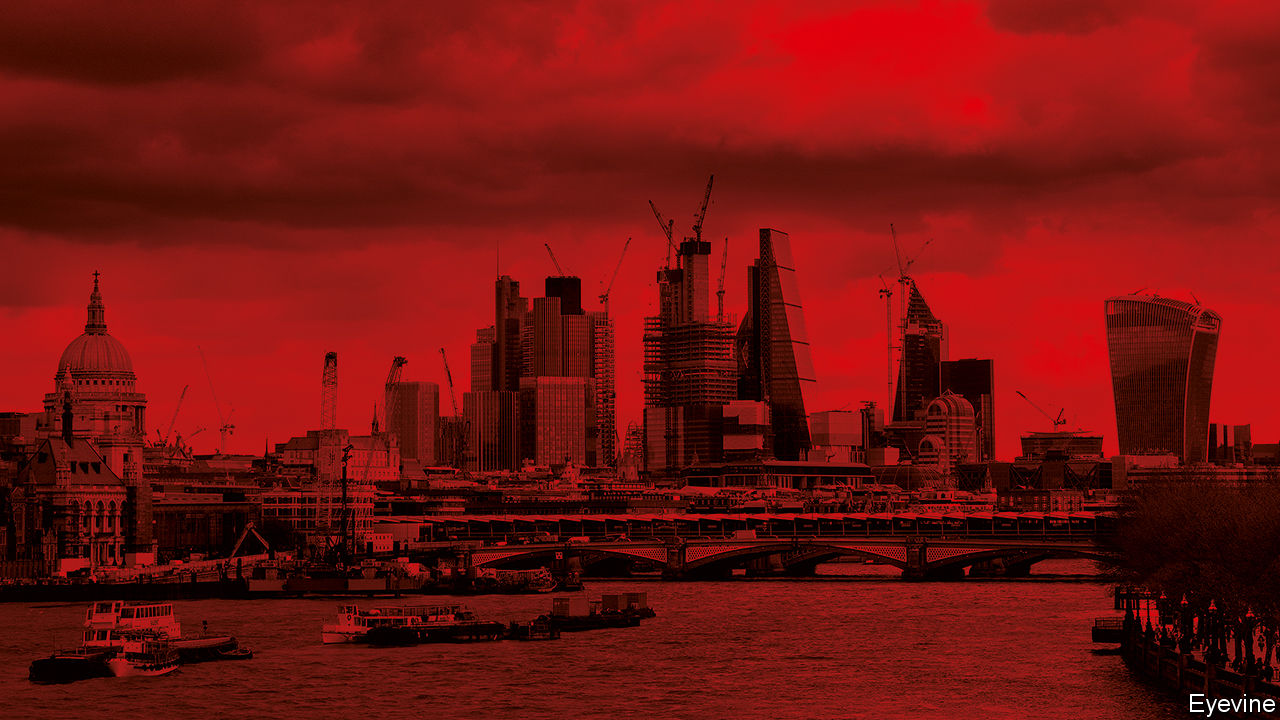
BRITAIN likes to see itself as a leader in the fight against illicit finance and corruption. The government has recently been talking even tougher, as worsening relations with Russia have focused attention on the number of oligarchs who have interests in London. Anyone looking to stash dirty money “should be in no doubt that we will come for them,” warns Ben Wallace, the economic-crime minister.
In fact the record suggests that wrongdoers can sleep easy (see article). The National Crime Agency (NCA) reckons that “many hundreds of billions of pounds” of international money is rinsed through British banks each year, much of it from kleptocrats and their cronies. Almost every big cross-border corruption case in recent years has had a connection to Britain or its palm-fringed overseas territories. British limited-liability partnerships were the vehicle of choice for suspicious clients of Danske Bank, which is embroiled in the laundering of as much as €200bn ($230bn).
Some people in the governing Conservative Party and the City argue that a big clean-up would be harmful just when British finance risks losing its lustre because of Brexit. The more important point is that, in a country which has undergone bail-outs and austerity following the financial crisis of 2008, doing nothing to tackle dirty capital flows could further undermine the legitimacy of capitalism.
Thames and misdemeanours
London is hardly unique. Other financial centres, including New York, Dubai and Singapore, also wash dodgy cash. The more clean money sloshes around, the easier it is to hide the dirty sort. But London has exceptionally enticing attributes. It handles vast cross-border capital flows. It boasts the English language, good schools and, ironically, a respected legal system (which shields tycoons against the arbitrary plunder they suffer at home). Relaxed rules on ownership are geared towards rich foreigners. Armies of lawyers and public-relations firms specialise in rinsing reputations. Tough libel laws help keep prying journalists and NGOs at bay. On top of all this, Britain has its own network of secretive offshore territories, dubbed its “second empire” by anti-corruption campaigners. London is, in short, ideal for money-laundering.
People give all sorts of reasons not to strangle this golden goose. The ancillary industries that depend on all that wealth would suffer. A clampdown risks scaring away legitimate investment, especially if it is seen as targeting entire nationalities: many Russians own London pads through offshore companies for reasons of privacy or legal tax planning. Some fear it would clobber the property market and the pound, just when a Brexit-bound Britain needs all the investment it can get.
But the case for action is stronger. Predictions of severe economic damage from a crackdown are overdone. Russians and Ukrainians hold only 0.2% of total British assets owned by foreigners. Targeting iffy Russian money would reinforce Britain’s efforts to embarrass Vladimir Putin’s intelligence agencies (see article). Providing financial refuge for bent elites fuels corruption in other countries.
The challenge is less to write new laws than to enforce what is on the books—a common malaise in Britain. This month the first “Unexplained Wealth Order”, which requires targets to show the sources of their wealth, survived a legal challenge from the wife of a jailed Azerbaijani banker. The government rightly trumpets reforms launched after David Cameron, a former prime minister, declared that corruption-fighting should be a priority. In 2016 Britain became the first G20 country to launch a public register of companies’ beneficial owners, designed to shed light on the shell companies behind which wrongdoers often hide. But the system relies on self-reporting. Companies House, a government agency, has neither the powers nor the resources to check what is submitted. The supervision of firms that set up other companies is so weak, and the fines for breaches so paltry—typically £1,000-2,000 ($1,310-2,620)—that it makes the British Virgin Islands look robust. Inevitably, therefore, the honest comply and criminals lie.
Worse, law enforcers lack the resources to pursue enough big cases. The NCA’s budget, already stretched, is falling. It has perhaps a few dozen investigators with the skills for complex cases; America and Italy have hundreds. This is not an area where justice comes cheap. On average, a big corruption case takes seven years. Prosecuting agencies need to be able to absorb hefty costs, especially if they lose—and, as oligarchs can afford the best lawyers, that is always a risk. Britain has not taken the lead on a large, cross-border case for years.
Devoting greater resources to corruption cases would go a long way towards fixing things. Some of the extra cash should be used to raise investigators’ salaries, which are far below those of their American peers. Strengthening oversight of shell companies and the firms that set them up would also help, as would money for the verification of ownership information. Some of the funding for this could come from an increase in incorporation fees, which are as little as £12. One piece of new legislation would help: a “failure to prevent” law that makes it easier to prosecute senior managers or companies if they fail to take adequate measures against money-laundering. A similar provision on bribery works well.
The fair mile
The City matters to Britain. It is a big employer (two-thirds of the jobs are outside London). It generates a trade surplus of 3% of GDP and pays roughly a tenth of the country’s taxes. It is a hub for fintech, and Britain’s smaller firms appear to secure financing more easily than their typical European counterparts do (see Schumpeter). The opposition Labour Party under Jeremy Corbyn sees things differently. It makes no secret of its deep hostility to finance. If the City does not demonstrate that its markets are clean and honest, it will be giving the next Labour government a freer hand to act—savagely.
Britain’s response to the threat posed by illicit financial flows has so far been more thundering rhetoric than meaningful action. It is time to put that right.







